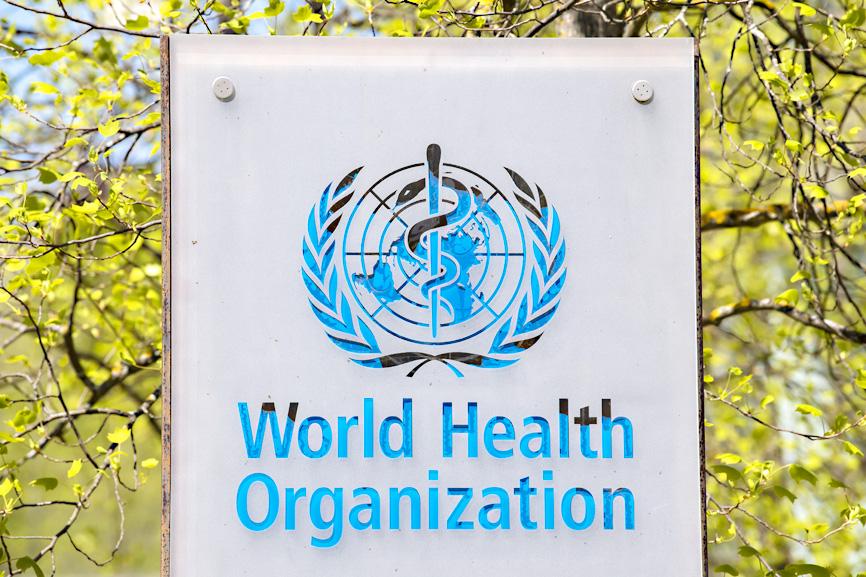US Deputy Secretary of State for Management and Resources Brian McKeon on Friday urged WHO Secretary-General Tedros Adhanom Ghebreyesus to grant Taiwan observer status in the World Health Assembly (WHA) next month, the US Department of State said.
McKeon met with Tedros, who was visiting Washington, to discuss WHO sustainable financing and reform priorities, department spokesperson Ned Price said in a statement.
During the meeting, McKeon also expressed the US’ commitment to COVID-19 pandemic efforts, amendments to the International Health Regulations, ongoing studies of COVID-19’s origins and Taiwan’s inclusion as an observer to the WHA, Price said.

Photo: AP
The request made by the deputy secretary of state followed a March 31 high-level working group meeting between Taiwan and the US in Washington, which focused on Taiwan’s participation in the 75th assembly set to take place from May 22 to May 28.
Taiwan had observer status at annual WHA meetings from 2009 to 2016, when relations between Taipei and Beijing were better under the then-ruling Chinese Nationalist Party (KMT). Since 2017, the WHO has refused to invite Taiwan to attend the assembly due to opposition from China.
In Taipei, the Ministry of Foreign Affairs yesterday thanked McKeon, saying that Taiwan would continue to enhance its partnership with like-minded countries to combat threats to world health and maintain a global order based on rules and shared democratic principles.
Additional reporting by Yang Cheng-yu

An essay competition jointly organized by a local writing society and a publisher affiliated with the Chinese Communist Party (CCP) might have contravened the Act Governing Relations Between the People of the Taiwan Area and the Mainland Area (臺灣地區與大陸地區人民關係條例), the Mainland Affairs Council (MAC) said on Thursday. “In this case, the partner organization is clearly an agency under the CCP’s Fujian Provincial Committee,” MAC Deputy Minister and spokesperson Liang Wen-chieh (梁文傑) said at a news briefing in Taipei. “It also involves bringing Taiwanese students to China with all-expenses-paid arrangements to attend award ceremonies and camps,” Liang said. Those two “characteristics” are typically sufficient

The brilliant blue waters, thick foliage and bucolic atmosphere on this seemingly idyllic archipelago deep in the Pacific Ocean belie the key role it now plays in a titanic geopolitical struggle. Palau is again on the front line as China, and the US and its allies prepare their forces in an intensifying contest for control over the Asia-Pacific region. The democratic nation of just 17,000 people hosts US-controlled airstrips and soon-to-be-completed radar installations that the US military describes as “critical” to monitoring vast swathes of water and airspace. It is also a key piece of the second island chain, a string of

A magnitude 5.9 earthquake that struck about 33km off the coast of Hualien City was the "main shock" in a series of quakes in the area, with aftershocks expected over the next three days, the Central Weather Administration (CWA) said yesterday. Prior to the magnitude 5.9 quake shaking most of Taiwan at 6:53pm yesterday, six other earthquakes stronger than a magnitude of 4, starting with a magnitude 5.5 quake at 6:09pm, occurred in the area. CWA Seismological Center Director Wu Chien-fu (吳健富) confirmed that the quakes were all part of the same series and that the magnitude 5.5 temblor was

The Central Weather Administration has issued a heat alert for southeastern Taiwan, warning of temperatures as high as 36°C today, while alerting some coastal areas of strong winds later in the day. Kaohsiung’s Neimen District (內門) and Pingtung County’s Neipu Township (內埔) are under an orange heat alert, which warns of temperatures as high as 36°C for three consecutive days, the CWA said, citing southwest winds. The heat would also extend to Tainan’s Nansi (楠西) and Yujing (玉井) districts, as well as Pingtung’s Gaoshu (高樹), Yanpu (鹽埔) and Majia (瑪家) townships, it said, forecasting highs of up to 36°C in those areas